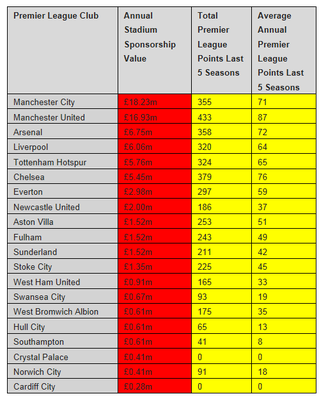
To see the differences in cultures one need only look at the naming of sporting stadiums. At the start of this month, American Appraisal (a company focused on valuation-related advisory services) released their estimates of the potential value of stadium naming rights in the Premier League. Their estimates are provided in the table in this blog post. Their analysis is well worth reading and is available here.
It is appropriate that a company with “America” in the title should provide the estimates of the stadium naming rights. Like so many other innovations is the business of sport, American has led the way. The American experience also shows how quickly things change. Michael Sandel says that in 1988 “only three sports stadiums had naming rights deals worth a total of $25 million” (here). Over the next 15 years things changed dramatically. He says that by 2004 “there were sixty-six deals, worth a total of $3.6 billion”.
Will the dominance of American sporting culture wash out the difference in stadium naming traditions in Europe? If it does then what will be lost? On a rough approximation, the grounds of English Premier League clubs tend to have a geography element – in the same way as the clubs have a geography element in their title. Words like “road”, “lane”, and “park” feature in the stadium names. Many fans do not want to lose these names. Change has occurred slowly so far - although some clubs have taken the opportunity of a move to a new stadium to introduce naming rights deals. Arsenal moved from Highbury to the Emirates Stadium. Manchester City moved from Maine Road to the City of Manchester Stadium before renaming it the Etihad Stadium.
In Ireland, GAA grounds tend to have the names of culturally significant people. The names of early patrons of the GAA such as “Croke” and “Cusack” feature prominently. Cork county teams play in two stadia that carry the names of two of the county's more famous sons. One stadium is named after the legendary hurler Christy Ring. The main stadium is named after Padraig O Caoimh who was General Secretary of the GAA for 35 years in the middle of the 20th century. Significantly, these stadia carry the Irish language version of the names.
It would be a pity if all of these cultural differences were lost. Cultural differences have an important place in sport.
Off the field they can help fans identify with the team and with the game itself. On the field, they can help the development of players like Gerard Deulofeu.
 RSS Feed
RSS Feed